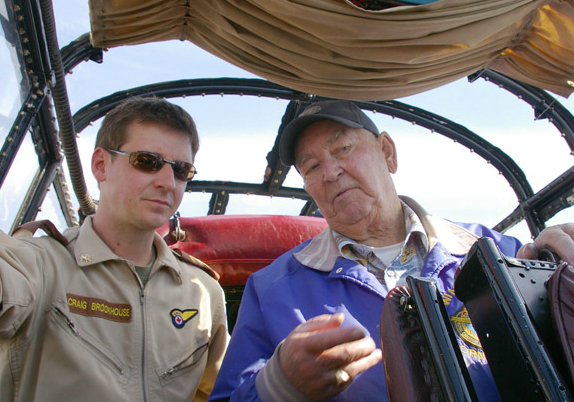By Claude McIntosh
CORNWALL, Ontario – The last surviving member of a Lancaster bomber crew that was part of RCAF/RAF Bomber Command 9 Squadron during the Second World War was laid to rest Thursday.
A funeral service for Robert “Bob” MacDonell was held at St. Andrews Roman Catholic Church. He would have turned 91 in February.
MacDonell was the pilot of a Lancaster bomber nicknamed “Lonesome Lola”. MacDonell and his crew flew dozens of dangerous night-time raids over a heavily-defended Germany and miraculously came through it all safe and sound.
He had some close calls and on a couple of times, but brought the crew and damaged plane safely back to their base in England.
The odds of surviving were horrendous and would be unacceptable by today’s standards. Of the 125,000 airmen who served with Bomber Command during the war, 55,573 were killed – a death rate of 44.4 per cent. Out of every 100 Bomber Command airmen, only 27 finished their tours unscathed; of that 100, 55 would be killed.
MacDonell enlisted in the RCAF as a teenager looking for excitement and within a short time found more terror than excitement while dodging heavy flak and Luftwaffe fighters.
While training in western Canada he met a young member of the women’s corps, Norma Monson. It was love at first sight. It became a long-distance romance when the young pilot was shipped off to England. Soon after each was discharged from the military they married – a union that would last 68 years and bring 10 children into the world.
Shortly after marrying, an airline expressed interest in signing him as a pilot.
“I think my mother intercepted the letter,” laughed one of his daughters, Kathy Mitchell.
Instead, he became a succesful businessman. He and a brother built and operated MacDonell’s Inn at Eamer’s Corners. He also launched MacDonell Garden Centre.
He took a keen interest in local politics, serving several years as a councillor in Ward 4 for the City of Cornwall. He had two unsuccessful mayoral bids, finishing second each time. He also helped found RCAFA Wing 424.
“He was ahead of his time,” said Mitchell. “Some of his ideas for the community were adopted years later.”
A man with a keen sense of humour, strong worth ethic and deep religioius faith, he seldom talked about the war. His medals included the prestigious Distinguished Flying Cross.
She said her father was a proud but humble man.
“He never wanted to be known as a war hero,” said his daughter. “He was proud of his service but didn’t want to glorify war.”
Mitchell said it was only in the last 10 years or so that her father started to talk to his family about his war experiences.



